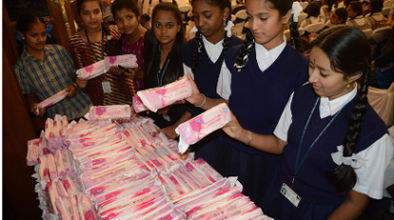INTRODUCTION
For far too long, menstruation has been shrouded in stigma and silence, holding back millions of Indian women and girls from reaching their full potential. The lack of access to sanitary products, inadequate infrastructure, and societal taboos have led to health complications, education setbacks, and economic disparities. But change is on the horizon.
The newly introduced Menstrual Hygiene Policy for School Going Girls marks a paradigm shift in addressing adolescent girls’ and women’s menstrual health needs. Approved by the Union Health Ministry on November 2, 2024, this comprehensive policy aims to mainstream menstrual hygiene within the school system, overcoming barriers of low awareness and restricted access to sanitary products.
By promoting menstrual hygiene policy, and awareness, improving access to high-quality sanitary napkins, and ensuring safe disposal practices, India aims to empower its women and girls, enhance their quality of life, and contribute to the country’s overall development.
THE APPROVED POLICY’S CONTEXT
The Menstrual hygiene policy was formulated following a Supreme Court order on April 10, 2023, the Union Ministry of Health and Family Welfare created in response to a Public Interest Litigation (PIL) filed by Jaya Thakur, seeking free sanitary pads for female students between Classes 6 and 12 and separate female toilet facilities in all government-aided and residential schools.
“This policy aims to mainstream menstrual hygiene within the school system of the government to bolster change in knowledge, attitudes, and behaviors, among schoolgirls, overcoming the barriers of low awareness that often restrict their freedom, mobility and participation in daily activities,” the affidavit, filed in the matter, stated.
On July 8, the Centre said a national policy on the distribution of menstrual hygiene products to adolescent female students was at an advanced stage of formulation. The PIL plea moved by Thakur, through advocate Varun Thakur, highlighted the difficulties faced by adolescent female students from underprivileged backgrounds in schools.
The Centre previously informed the court that it was in the process of collating all necessary material to form a national menstrual hygiene policy on the distribution of menstrual hygiene products to female school students in terms of the court’s orders dated April 10, 2023, and November 6, 2023.
The top court also directed the Centre to frame a national model for building toilets commensurate with the number of female students in all government-aided and residential schools in the country.
While emphasizing a uniform procedure, it also asked the Centre about the national menstrual hygiene policy it formulated to distribute sanitary napkins to female school students.
OBJECTIVES OF MENSTRUAL HYGIENE POLICY
The primary objective of India’s Menstrual Hygiene Policy is to promote menstrual health and hygiene among adolescent girls, particularly those in rural and disadvantaged areas. The policy aims to create a supportive environment that encourages girls to manage their menstruation safely, hygienically, and with dignity.
The policy focuses on increasing awareness and education about menstrual health to achieve this. This includes integrating menstrual hygiene into school curricula, training teachers, and conducting community outreach programs. By dispelling myths and misconceptions surrounding menstruation, the policy seeks to break the stigma associated with this natural biological process.
Another critical objective is improving access to high-quality sanitary napkins and menstrual hygiene products. The policy aims to ensure the availability, affordability, and accessibility of these products, particularly in rural areas. This includes setting up sanitary napkin vending machines, promoting eco-friendly alternatives, and encouraging local production.
KEY INITIATIVES
The policy prioritizes awareness and education through integrating menstrual hygiene into school curricula, training teachers, and conducting community outreach programs. Workshops and seminars will be organized for adolescent girls to dispel myths and misconceptions surrounding menstruation.
To ensure access to sanitary products, the policy provides free hygienic pads for school-going girls and sets up sanitary napkin vending machines in schools. Eco-friendly alternatives like reusable pads and menstrual cups will be promoted, and local production of hygienic products encouraged.
Infrastructure development is another critical aspect, with separate toilet facilities for female students, clean water, soap, and menstrual waste disposal facilities. This will ensure a hygienic environment for girls to manage their menstruation.
Additionally, the policy includes research and monitoring initiatives, such as surveys to assess menstrual hygiene policy and needs, monitoring policy implementation, and data collection on menstrual hygiene indicators. Partnerships with NGOs, civil society organizations, and private sector companies will support resource mobilization and effective implementation.

CHALLENGES AND SOLUTIONS
India’s Menstrual Hygiene Policy faces several challenges that hinder its effective implementation. One of the primary challenges is the social stigma surrounding menstruation, which leads to low awareness and discussion.
Additionally, limited access to sanitary products, particularly in rural areas, poses a significant hurdle. Inadequate toilet facilities, water, and soap in schools and public spaces further exacerbate the issue. The high costs of sanitary products make them unaffordable for low-income families, and the limited understanding of menstrual health and hygiene among girls, women, and educators perpetuates the problem.
The lack of infrastructure, affordability, menstrual hygiene policy, and education contributes to the persistence of hygiene issues. Moreover, cultural and societal norms often restrict open discussions about menstruation, making it difficult to address the issue effectively. Addressing these challenges requires a multi-faceted approach that involves government initiatives, community engagement, and education.
To overcome these challenges, India’s Menstrual Hygiene Policy proposes several solutions. Awareness campaigns, subsidized sanitary products, infrastructure development, education, and training are crucial short-term measures. Integrating menstrual hygiene policy into school curricula and training educators will help dispel myths and misconceptions. Partnerships with NGOs, private sector companies, and community organizations will facilitate resource mobilization and effective implementation.
In the long term, policy implementation, sustainable sanitary products, community engagement, research, and development will ensure sustained progress. The government must allocate necessary resources, establish monitoring mechanisms, and engage stakeholders to ensure effective implementation.
IMPLEMENTATION AND MONITORING
Effective execution of India’s Menstrual Hygiene Policy requires a well-planned implementation strategy. This involves inter-ministerial coordination, state-level planning, district-level execution, capacity building, and resource allocation. A national mission will oversee policy implementation, supported by state-level monitoring cells and district-level review committees.
To track progress, key performance indicators will be established, focusing on menstrual hygiene awareness, access to sanitary products, school attendance, menstrual-related health issues, and women’s workforce participation. Regular independent evaluations and community feedback will ensure accountability.
Challenges such as inadequate resources, social stigma, and infrastructure gaps will be addressed through targeted solutions. Additional funds will be mobilized, awareness campaigns intensified, and infrastructure development prioritized. A timeline for implementation will be established, with short-term, mid-term, and long-term objectives.
A dedicated budget allocation will be made, comprising central government funding, state government funding, private sector partnerships, and international aid. Responsible authorities, including the National Ministry of Health and Family Welfare, state health departments, district administrations, and NGOs, will work collaboratively to ensure successful policy implementation.
Effective monitoring and evaluation will be crucial to the policy’s success. Regular review meetings, community engagement, and data analysis will inform course corrections and scaling up successful models. By implementing the Menstrual Hygiene Policy efficiently, the government can transform the lives of millions of girls and women, promoting health, dignity, and empowerment.
PROGRESS SO FAR:
The Centre has made significant progress in providing separate toilet facilities for female students, with West Bengal at 99.9%, Uttar Pradesh at 98.8%, and Tamil Nadu at 99.7%.
IMPACT ON WOMEN’S EMPOWERMENT
Menstrual Hygiene Policy marks a significant step towards women’s empowerment, addressing a critical aspect of their lives that has long been neglected. By promoting menstrual hygiene and free sanitary napkins for school girls, the policy aims to break the societal stigma surrounding menstruation, enabling girls and women to manage their periods with dignity. This, in turn, contributes to their social empowerment, fostering confidence and self-esteem.
The policy’s economic implications are equally significant. Better menstrual hygiene policy enables women to participate in the workforce without restrictions, leading to increased economic independence. Entrepreneurial opportunities also emerge as women can start businesses related to sanitary products and services. This not only enhances their financial stability but also creates employment opportunities for others.
The emotional empowerment that results from improved menstrual hygiene cannot be overstated. Reduced anxiety and stress related to menstruation contribute to improved mental health, while better menstrual health enhances overall physical and emotional well-being. By addressing these fundamental needs, the policy supports women’s holistic development, enabling them to realize their full potential.
In the long term, the Menstrual Hygiene Policy will drive inter-generational change, as educated girls and women educate their families and communities. Societal transformation will follow, as normalized discussions about menstruation foster a more inclusive and equitable society.
CONCLUSION
India’s new Menstrual Hygiene Policy represents a landmark initiative in promoting the health, dignity, and empowerment of girls and women. The policy paves the way for a more inclusive and equitable society by addressing the complex challenges surrounding menstrual hygiene.
Through its comprehensive approach, the policy ensures that girls and women have access to education, sanitary products, and infrastructure, empowering them to manage their menstruation with confidence and dignity.
As India continues to implement and scale up this policy, it is essential to recognize the transformative impact it can have on women’s lives. By breaking down societal taboos, promoting economic independence, and fostering emotional well-being, India’s Menstrual Hygiene Policy embodies a critical step towards achieving gender equality.
Ultimately, this policy serves as a model for other nations, demonstrating the power of policy-driven change in promoting menstrual hygiene and women’s empowerment. As we move forward, it is crucial to sustain momentum, address remaining challenges, and ensure that every girl and woman in India can thrive, unhindered by the stigma and constraints of menstruation.
– SHEELU KUMARI
MUST READ: JUSTICE NAGARATHNA SLAMS STATES FOR LETTING AFFORESTATION FUNDS GATHER DUST


